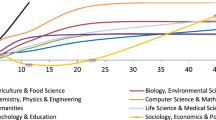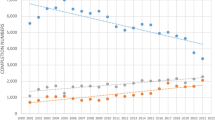While most doctoral students aspire to become a full-time professor, many graduates with doctoral degrees may instead be employed in temporary positions as university teachers or researchers. The purpose of this paper is to assess the extent to which these early employment experiences differ for doctoral graduates of various fields of study, using Canada as a case study. Drawing on Statistics Canada’s 2013 National Graduates Survey, our results reveal that doctoral graduates of most fields, especially those with degrees in the sciences, arts, and humanities, are more likely to be in temporary forms of academic employment than they are as full-time professors, 3-to-4 years after graduation. The findings highlight the labor market realities facing doctoral graduates in the Canadian academic labor market. They should also be very informative to researchers and policy analysts in other countries where doctoral graduates experience similar challenges navigating academic job markets.



Similar content being viewed by others
References
Acker, S. and Haque, E. (2017) ‘Left out in the academic field: Doctoral graduates deal with a decade of disappearing jobs’, Canadian Journal of Higher Education 47(3): 101–119.
Afonso. A. (2016) ‘Varieties of academic labor markets in Europe’, Political Science and Politics 49(4): 816–821.
Allen, C.M., Smyth, E.M. and Wahlstrom, M. (2002) ‘Responding to the field and to the academy: Ontario’s evolving PhD’, Higher Education Research and Development 21(2): 203–214.
Baird, L.L. (1990) ‘Disciplines and doctorates: the relationships between program characteristics and the duration of doctoral study’, Research in Higher Education 31(4): 369–385.
Boudarbat, B. and Connolly. M. (2013) ‘The gender wage gap among recent post‐secondary graduates in Canada: a distributional approach’, Canadian Journal of Economics/Revue Canadienne d’économique 46(3):1037–1065.
Boulos, A. (2016) ‘The labour market relevance of PhDs: an issue for academic research and policy-makers’, Studies in Higher Education 41(5): 901–913.
Brownlee, J. (2015) ‘Contract faculty in Canada: using access to information requests to uncover hidden academics in Canadian universities’, Higher Education: The International Journal of Higher Education Research 70(5): 787–805.
Clark, I., Moran, G., Skolnik, M. and Trick, D. (2009) Academic transformation: the forces shaping higher education in Ontario, Montreal: McGill-Queen’s University Press.
Conference Board of Canada (2019) PhD graduates. Retrieved November 2019, from https://www.conferenceboard.ca/hcp/provincial/education/phd.aspx#ftn3.
Conti, A. and Visentin, F. (2015) ‘A revealed preference analysis of PhD students’ choices over employment outcomes’, Research Policy 44(10): 1931–1947.
Desjardins, L. (2012) Profile and labour market outcomes of doctoral graduates from Ontario universities, Ottawa, ON: Statistics Canada. Catalogue no. 81-595-M. No. 098.
Desjardins, L. and King, D. (2011) Expectations and labour market outcomes of doctoral graduates from Canadian universities, Ottawa, ON: Statistics Canada and Human Resources and Skills Development Canada. Retrieved from: www.statcan.gc.ca/pub/81-595-m/81-595-m2011089-eng.pdf.
Edge, J. and Munro, D. (2015) Inside and outside the academy: valuing and preparing PhDs for careers, Ottawa, ON: The Conference Board of Canada.
Etmanski, B., Walters, D. and Zarifa, D. (2017) ‘A change in plans: the career prospects of recent Ph.D. graduates in Academia’, The Canadian Journal of Higher Education 47(3): 152–169.
Field, C., Khoyetsyan, A., Jones, G.A. and Stephenson, G.K. (2014) The ‘other’ university teachers: non-full time instructors at Ontario universities, Toronto, ON: Higher Education Quality Council of Ontario.
Field, C. and Jones, G. (2016) A survey of sessional faculty in Ontario publicly-funded universities. Report to the Ontario Ministry of Advanced Education and Skills Development. Centre for the Study of Canadian and Higher Education.
Ferguson, S.J. and Wang. S. (2014) Graduating in Canada: profile, labour market outcomes and student debt of the class of 2009–2010, Ottawa, ON: Statistics Canada, Catalogue no. 81-595-M – No. 2014101.
Fox, J. and Andersen, R. (2006) ‘Effect displays for multinomial and proportional-odds logit models’, Sociological Methodology 36(1): 225–255.
Huisman, J., Bartelse, J. and De Weert, E. (2002) ‘Academic careers from a European perspective’, The Journal of Higher Education 73(1): 141–160.
Jackson, D. and Michelson, G. (2015) ‘Factors influencing the employment of Australian PhD graduates’, Studies in Higher Education 40(9): 1660–1678.
Jehn, A., Walters, D. and Howells, S. (2019) ‘Employment and wage gaps among recent Canadian male and female postsecondary graduates’, Higher Education Policy. https://doi.org/10.1057/s41307-019-00162-0.
Jonker, L. (2016) Ontario’s PhD graduates from 2009: Where are they now? Toronto, ON: Higher Education Quality Council of Ontario. Queen’s Printer for Ontario. http://www.heqco.ca/SiteCollectionDocuments/Ontario%27s-PhD-Graduates-from-2009-ENG.pdf.
Kezar, A., Maxey, D. and Holcombe, E. (2016) ‘The professoriate reconsidered: a study of new faculty models’, Thought and Action 32(1): 65–88.
Konstantopoulos, S. and Constant, A. (2008). ‘The gender gap reloaded: Are school characteristics linked to labour market performance?’ Social Science Research 37(2): 374–385.
Kot, F.C. and Hendel, D.D. (2011) ‘Emergence and growth of professional doctorates in the United States, United Kingdom, Canada and Australia: a comparative analysis’, Studies in Higher Education 37(3): 345–364.
Long, S. and Freese, J. (2014) Regression models for categorical dependent variables using stata, College Station, TX: A Stata Press Publication, Statacorp LP.
MacDonald, M. (2013) Sessionals, up close, University Affairs. Retrieved from: http://www.universityaffairs.ca/features/feature-article/sessionals-up-close/.
Maldonado, V., Wiggers, R. and Arnold, C. (2013) So you want to earn a PhD? The attraction, realities, and outcomes of pursuing a doctorate, Toronto, ON: Higher Education Quality Council of Ontario. Retrieved from: http://www.heqco.ca/SiteCollectionDocuments/At%20Issue%20Doctoral%20ENGLISH.pdf.
Muzzin, L. (2013) Deciding on a career in the college sector, Academic Matters. November Issue. Retrieved from https://academicmatters.ca/deciding-on-a-career-in-the-college-sector/.
Neumann, R. and Tan, K. (2011) ‘From PhD to initial employment: the doctorate in a knowledge economy’, Studies in Higher Education 36(5): 601–614.
Omiecinski, T. (2003) ‘Hiring of part-time university faculty on the increase’, Education Quarterly Review 9(3): 9–15.
Paolo, A.D. and Mañé, F. (2016) ‘Misusing our talent? Overeducation, overskilling and skill underutilisation among Spanish PhD graduates’, The Economic and Labour Relations Review 27(4): 432–452.
Pedersen, H.S. (2014) ‘New doctoral graduates in the knowledge economy: trends and key issues’, Journal of Higher Education Policy and Management 36(6): 632–645.
Rajagopal, I. (2002) Hidden academics: contract faculty in Canadian universities, Toronto, ON: University of Toronto Press.
Reithmeier, R., O’Leary, L., Zhu, X., Dales, C., Abdulkarim, A., Aquil, A., et al. (2019) ‘The 10,000 PhDs project at the University of Toronto: using employment outcome data to inform graduate education’, PLoS ONE. https://doi.org/10.1371/journal.pone.0209898.
Recotillet, I. (2007) ‘PhD graduates with post-doctoral qualification in the private sector: Does it pay off?’ Labour 21(3): 473–502.
Schofer, E. and Meyer, J.W. (2005) ‘The worldwide expansion of higher education in the twentieth century’, American Sociological Review 70(6): 898–920.
Walters, D. (2004) ‘A comparison of the labour market outcomes of postsecondary graduates of various levels and fields over a four-cohort period’, Canadian Journal of Sociology 29(1): 1–27.
Warme, B. and Lundy, K. (1988) ‘Erosion of an ideal: the presence of part-time faculty’, Studies in Higher Education 13(2): 201—213.
Wildy, H., Peden, S. and Chan, K. (2015) ‘The rise of professional doctorates: case studies of the doctorate in education in China, Iceland and Australia’, Studies in Higher Education 40(5): 761–774.
Author information
Authors and Affiliations
Corresponding author
Ethics declarations
Conflict of interest
On behalf of all authors, the corresponding author states that there is no conflict of interest.
Additional information
Publisher's Note
Springer Nature remains neutral with regard to jurisdictional claims in published maps and institutional affiliations.
Appendix
Appendix
See Table 4.
Rights and permissions
About this article
Cite this article
Walters, D., Zarifa, D. & Etmanski, B. Employment in Academia: To What Extent Are Recent Doctoral Graduates of Various Fields of Study Obtaining Permanent Versus Temporary Academic Jobs in Canada?. High Educ Policy 34, 969–991 (2021). https://doi.org/10.1057/s41307-020-00179-w
Published:
Issue Date:
DOI: https://doi.org/10.1057/s41307-020-00179-w




